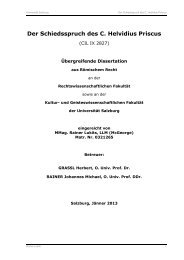(post) Keck Case Law on the Freedom to Provide Services
(post) Keck Case Law on the Freedom to Provide Services
(post) Keck Case Law on the Freedom to Provide Services
You also want an ePaper? Increase the reach of your titles
YUMPU automatically turns print PDFs into web optimized ePapers that Google loves.
These requirements, such as authorisati<strong>on</strong>, swearing an oath or registrati<strong>on</strong>, infringe <strong>on</strong> <strong>the</strong>principle of mutual recogniti<strong>on</strong>. The ec<strong>on</strong>omic ac<strong>to</strong>r lawfully provides services in hishome State. The host State has <strong>to</strong> recognise this and is not allowed <strong>to</strong> make him complywith an additi<strong>on</strong>al set of rules.Recently in Commissi<strong>on</strong> v. Italy (mo<strong>to</strong>r insurance) 132 Italian law required all insurancecompanies <strong>to</strong> offer third-party liability mo<strong>to</strong>r insurance. The companies were obliged <strong>to</strong>offer insurance <strong>to</strong> any potential cus<strong>to</strong>mer under terms and rates <strong>the</strong> company had <strong>to</strong>publish in advance. Moreover, <strong>the</strong> freedom of <strong>the</strong> companies <strong>to</strong> set <strong>the</strong>ir premiums waslimited by <strong>the</strong> law as well. The Court decided that <strong>the</strong> law c<strong>on</strong>stituted a restricti<strong>on</strong> of <strong>the</strong>freedom of establishment and <strong>to</strong> provide services, because a foreign insurance companywould be required <strong>to</strong> re-think its business strategy which could result in significantadditi<strong>on</strong>al costs. 133 The obligati<strong>on</strong> <strong>to</strong> c<strong>on</strong>tract renders access <strong>to</strong> <strong>the</strong> Italian market lessattractive and, if <strong>the</strong>y obtain access <strong>to</strong> that market, reduces <strong>the</strong> ability of <strong>the</strong> undertakingsc<strong>on</strong>cerned <strong>to</strong> compete effectively against undertakings traditi<strong>on</strong>ally established in Italy.Again, <strong>the</strong> use of <strong>the</strong> market access criteri<strong>on</strong> case can be returned <strong>to</strong> <strong>the</strong> principle ofmutual recogniti<strong>on</strong>. 134 The terms of <strong>the</strong> insurance c<strong>on</strong>tract which c<strong>on</strong>cern <strong>the</strong> riskassessment and calculati<strong>on</strong> of <strong>the</strong> premium should be regarded as <strong>the</strong> service or “product”132<str<strong>on</strong>g>Case</str<strong>on</strong>g> C-518/06, Commissi<strong>on</strong> v. Italy (mo<strong>to</strong>r insurance), [2009] ECR I-3491.133Ibid., paras. 68 ff. Never<strong>the</strong>less <strong>the</strong> restricti<strong>on</strong> could be justified by <strong>the</strong> aim of social protecti<strong>on</strong> forvictims of road traffic accidents.134But see also ibid., para 70. The Court seems <strong>to</strong> refer <strong>to</strong> a n<strong>on</strong>-discriminati<strong>on</strong> test, because it comparedtraditi<strong>on</strong>ally established undertakings <strong>to</strong> undertakings from outside, which could be interpreted as acomparis<strong>on</strong> between traditi<strong>on</strong>al, mostly domestic, and new, mostly foreign, undertakings.40




